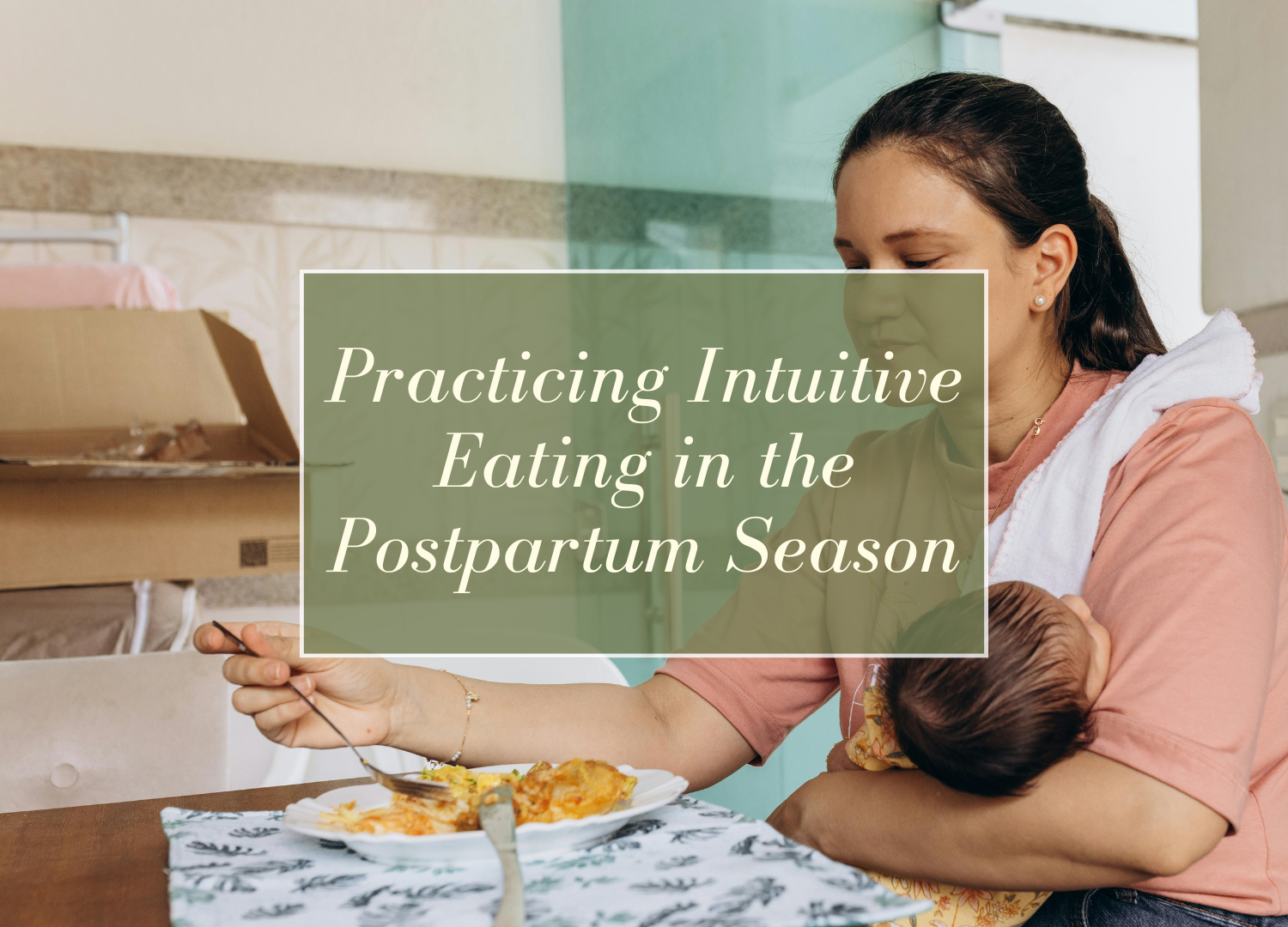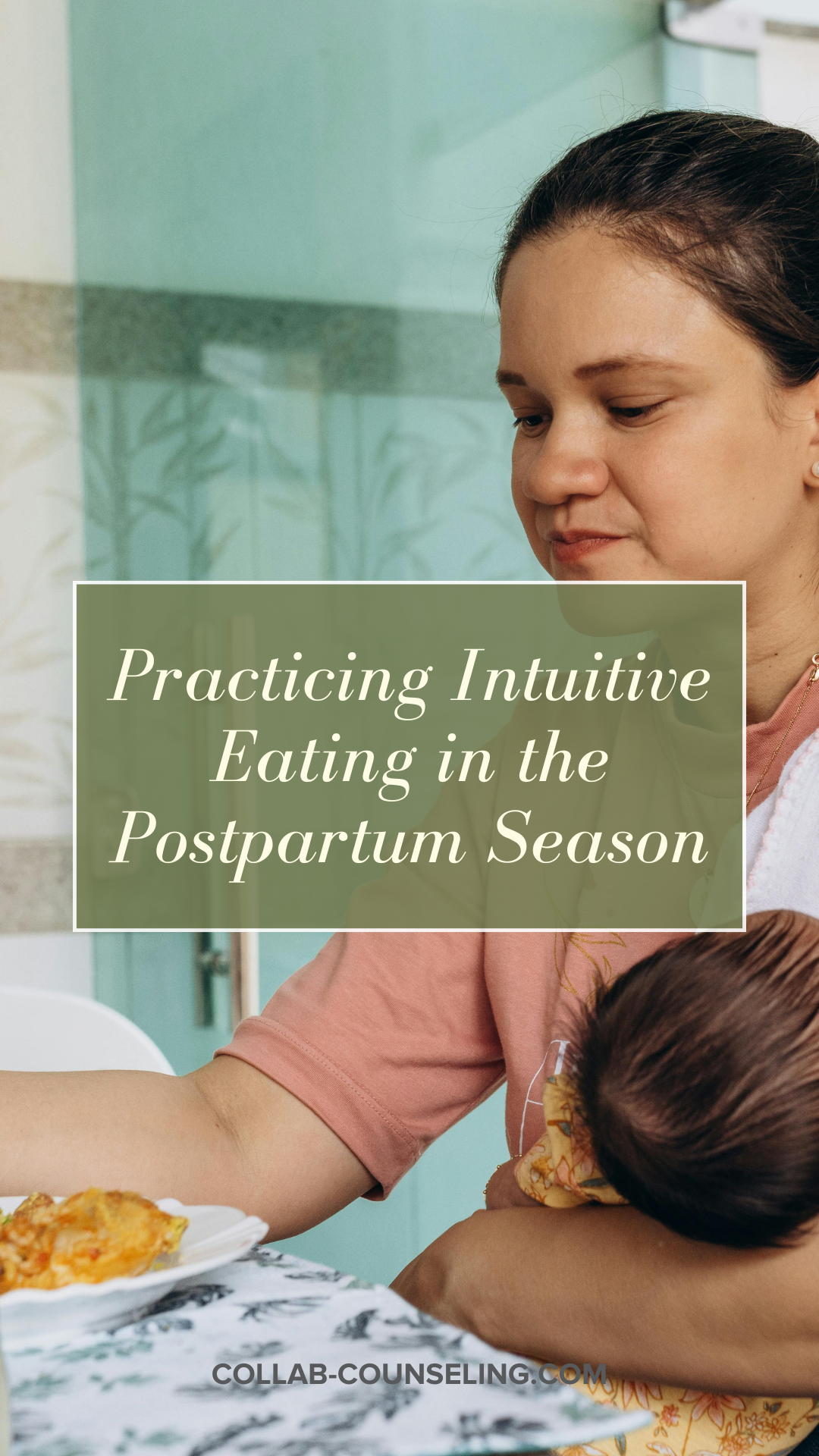Switching the Lens to Nourishment: Practicing Intuitive Eating in the Postpartum Season
When you hear the phrase intuitive eating, it might feel distant or impossible in those early days postpartum, between the feedings, the sleep deprivation, and the physical/emotional recovery, big-picture ideas about nutrition can feel overwhelming. But intuitive eating during postpartum doesn’t need to be perfect. It’s about practicing curiosity and flexibility during this season so that you can reconnect with your body in this new season, honor your strength, and figure out what feels nourishing for both you and your little one. We are so excited to hear from therapist, Michelle Butler, MSW, LCSW, again to share all the details about how to practice intuitive eating in the postpartum season. Take it away, Michelle!
What Is Intuitive Eating?
Intuitive eating means letting your body guide what, when, and how much to eat—trusting your internal cues (hunger, fullness, satisfaction) rather than strict rules, diet guidance, or external pressures. It’s built on compassion, flexibility, and recognizing that your needs are likely changing constantly.
In a postpartum context, intuitive eating honors not only your own needs, but also the changes your body is going through: recovery from birth (and possibly surgery), establishing milk supply (if you’re breastfeeding or pumping), hormonal shifts, changes in sleep, and emotional adjustment. Your eating needs to support all of this.
Why Practicing Intuitive Eating Postpartum Matters
Physical healing: Your body has just done an intense job. Repairing tissue, adjusting hormones, replenishing nutrients, this takes energy and raw materials. Intuitive eating helps ensure you’re getting enough protein, healthy fats, and micronutrients by listening to signals like fatigue, milk supply, and digestion.
Supporting milk supply (if relevant): Your caloric and hydration needs are likely increased. Intuitive eating encourages you to respond to hunger and thirst rather than trying to stick with restrictive “healthy” guidelines that may fall short. This supports your energy levels and your milk output.
Emotional health: Feeling guilty, pressured, or anxious about food during postpartum is common. Intuitive eating helps reduce that stress by shifting the emphasis from “eating perfectly” to “nourishing what feels good, what works, what restores.”
Adaptability: Your postpartum needs one day will likely be different than the next. You might need more carbs when you have to get up many times during the night. You might crave more protein when you’re healing. Intuitive eating allows for that variation.
What Intuitive Eating Looks Like Postpartum
Below are some practices adapted to the postpartum period. They’re not rules, just ideas to try out, notice, and adapt. Your path will look different from someone else’s, and that’s totally okay.
Honor hunger early
When you listen to your hunger signals and respond before you are ravenous, it’s easier to choose more nourishing options. Postpartum hunger can sneak up fast, especially when you’re awake late nights or pumping.Include all macronutrients
Try to have protein, healthy fats, and carbohydrates in your meals or snacks. Protein supports healing and milk supply; fats support hormone regulation and satiety; carbohydrates (especially whole/complex ones) give you energy. Also, simple carbs are not villainous; they’re sometimes what your body needs when energy is low.Fuel frequently and consistently
Eating something every few hours (snack or meal) can prevent the crash that comes from waiting too long. This consistency supports mood, energy, milk supply, and recovery.Be kind to your body
Postpartum bodies are doing a lot. Scars, bleeding, swelling, new aches, hormonal changes, they all influence what you want to eat and what feels doable. Give yourself permission to rest. Give yourself permission for meals that are more about comfort than perfection.Prioritize satisfaction (not just nutrition)
Taste, texture, warmth, and familiarity all matter. A meal that nourishes and brings comfort/familiarity is doing a lot of good. Satisfaction helps you stick with eating well long-term more than forcing foods that feel punitive.Hydrate well
For all new moms, fluids are critical, especially if breastfeeding or pumping. Sometimes what feels like hunger or fatigue is low hydration. Keeping water or hydrating fluids nearby helps.Embrace flexibility
There will be days when everything feels off: the baby is fussier, you’re extra tired, and your appetite is weird. That’s okay. Some days you’ll eat more carbs; some days, protein looks different. That doesn’t mean you’ve “failed”—it means your body is speaking, you’re listening, and you’re learning.Check in with your body
Instead of thinking, “Why did I eat that donut?” or “I should’ve had a salad instead”, try asking: “How did that donut feel? Energizing? Comforting? Too sweet?” Notice physical and emotional cues. These are helpful data for future meals.
What Intuitive Eating Isn’t
It’s not “eat whatever, whenever” without any awareness; it still involves listening and learning.
It’s not an excuse to guilt-free binge; rest and emotional work are part of the picture.
It’s not about comparing yourself to others or chasing an ideal.
It’s not permanent in rigid form; it evolves as your baby grows, as your sleep improves, as your recovery progresses.
Putting It Into Action: Simple Steps You Can Try This Week
Keep a list of 3–5 foods you love that also make you feel good. Use that list when you’re too tired to think about what to eat.
Set alarms or reminders if you tend to skip meals, or keep snacks in places you’ll see them (purse, car, nightstand).
Once a day, pause 30 seconds before eating: ask “Am I hungry?” and “What would feel satisfying right now?” Choose what feels nourishing.
Plan for easy meals for the night after birth or hard days: something comforting and simple.
This season can feel tender and vulnerable—allow others to show up for you. Let friends and family help with meals, laundry, or other daily tasks. Nourishment doesn’t just come from food; it comes from connection and support, too.
Final Thoughts
Intuitive eating postpartum is not about perfection. It’s about practicing flexibility and curiosity in this season of change. It’s about feeding your body with compassion, feeding it well enough to heal, to nourish, to love this new phase. It’s about being gentle with your expectations and attentive to your needs.
You deserve nourishment, mindful, intuitive, compassionate nourishment, that grows with you and your baby.
Moving Forward
If you or someone you love needs support postpartum, reach out to the Collaborative Counseling and Nutrition Team today!


